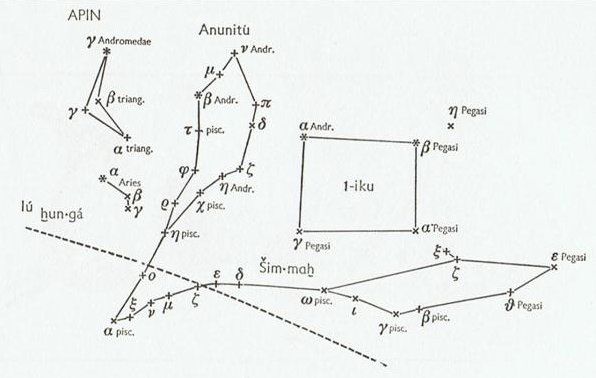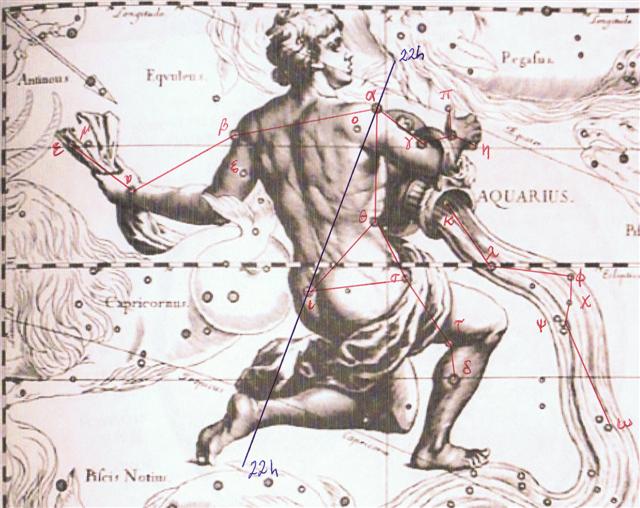The Chinese Extended Net
began with ε Hydrae (131.9) and stretched
for around 25 days, ending in August 25
(237). The end star of the Extended Net
(μ Hydrae) was close to the Full Moon in
February 24:
|
BISSEXTUM (6) |
5 |
|
Februarius 24
|
Februarius 24
|
25 |
|
February 24 |
25 (56) |
26 |
|
August 25
(237) |
26 |
27 |
 |
 |
 |
|
Cb13-15 (314) |
Cb13-16 |
Cb13-17 (708) |
|
kua moe ki te
marama |
e marama erua |
te kava -
te moa |
|
δ Tucanae
(340.1), ρ
Cephei (340.2),
ζ Aquarii (340.4),
Alrediph
(340.5),
5/1100 Lac
(340.7), σ
Aquarii,
6/650 Lac.
(340.9) |
leap day |
α/91 Lac.
(341.1), Homan,
β Piscis
Austrini
(341.2), ν
Tucanae (341.5),
υ Aquarii (341.9 |
|
Extended Net-26 |
Shir (158.9) |
p Carinae
(159.3) |
|
μ HYDRAE (157.1) |
|
4 |
3 |
2 |
1 |
|
Februarius 26 |
27 |
28 (60) |
Martius
1 |
|
February 27 |
28 |
29 (60) |
March 1 |
|
August 28
(240) |
29 |
30 |
31 |
 |
 |
 |
 |
|
Cb13-18 |
Cb13-19 |
Cb13-20 |
Cb13-21 (320) |
|
ihe tara tu |
te hokohuki |
te henua |
te hokohuki
hoi haatu ia -
te hokohuki |
|
η Aquarii
(342.1), Situla
(342.7) |
ε Piscis
Austrini
(343.5), ο
Pegasi (343.8) |
Matar
(344.2) |
λ Pegasi
(345.0), ξ
Pegasi (345.1),
τ Aquarii
(345.7), μ
Pegasi (345.9) |
|
φ Hydrae (160.3) |
no star listed |
Vathorz
Posterior
(162.1),
Peregrini, η
Carinae (162.6) |
ν Hydrae (163.1) |
|
March 2 |
3 (63) |
4 |
5 |
|
September1 (244) |
2 |
3 |
4 |
 |
 |
 |
 |
|
Cb13-22 |
Cb13-23 |
Cb13-24 |
Cb13-25 (324) |
|
te ika |
kua moe ku
hakarava |
te honu kau |
oho te vae |
|
ι Cephei
(346.0),
λ
Aquarii,
γ Piscis
Austrini, σ
Pegasi (346.5) |
Scheat Aquarii
(347.0), ρ
Pegasi (347.2),
δ Piscis
Austrini
(347.4),
Fomalhaut
(347.8) |
Fum al
Samakah
(348.3) |
Al Fargh al
Mukdim-24 /
Purva
Bhādrapadā-26 /
House-13 |
|
Scheat
Pegasi,
π Piscis
Austrini
(349.3),
MARKAB PEGASI
(349.5) |
|
no star listed |
Wings-27 |
Merak (166.2) |
11h (167.4) |
|
ALKES
(165.6) |
Dubhe (166.7) |
I imagine Metoro's words
could mean that when the 'Earth Turtle'
(te honu) began to 'swim' (kau),
her legs (te vae) were no
longer necessary. At the other end of
the sky the Chinese instead talked about
wings.
It was the time of the Fish-mouth (Fom-al-haut,
Fum al Samakah) and perhaps Cb13-22 could
illustrate this fact. Metoro simply said
te ika (the Fish).
The Arabs had the Fore Spout (Al
Fargh al Mukdim) here. Water forced
the creatures to swim, to become fishes,
because Earth began to be inundated at
heliacal Scheat (β
Pegasi) and Markab (α
Pegasi):

23h occurred 350 days after the March
equinox:
|
March 6 |
7 |
8 (68) |
9 |
10 |
|
September 5 |
6 |
7 (250) |
8 |
9 |
 |
 |
 |
 |
 |
|
Cb13-26 |
Cb13-27 |
Cb13-28 |
Cb13-29 |
Cb13-30 (329) |
|
ku tutu te
inoino |
te hau tea |
hokohuki ki
te niu |
te tamaiti |
|
23h (350.0) |
Simmah
(351.7) |
φ Aquarii
(352.0),
ψ Aquarii
(352.4),
χ Aquarii
(352.6), γ
Tucanae (352.8) |
ο Cephei
(353.3), Kerb
(353.6) |
κ Piscium
(354.2), θ
Piscium (354.4),
υ Pegasi (354.9) |
|
π Cephei
(350.6) |
|
Al Sharas
(168.6) |
Al
Zubrah-9 /
Purva
Phalguni-11 |
Alula (170.5),
Labrum (170.6) |
λ Crateris
(171.6), ε
Crateris (171.9)
|
γ Crateris, π
Centauri
(172.0), κ
Crateris (172.5) |
|
Zosma
(169.2),
COXA
(169.4) |
According to Hevelius the flow from the
Urn crossed the ecliptic at
λ (which
letter probably indicated the disappearance of
light), and in rongorongo times this
happened in March 2 (where the Sun 'was
swallowed by the Fish'):

In March 8 (68) the 3 stars
ψ, φ, χ
Aquarii could have marked a point from where there
were 300 days remaining of a year with
368 = 8 * 46 days.
The last glyph in line
Cb13 is a niu, yet Metoro said it
meant 'the child' (te tamaiti).
Possibly the top sign like an open mouth
was the reason.
Gregorian day 329
(November 25) was when Antares rose with
the Sun, and Cb13-30 is glyph 329
counted from the beginning of side b.
September 6 (249) = 329
(November 25) - 80, and this was when in
rongorongo times Coxa and Zosma rose
heliacally. Al Zubra means the
Mane (of the Lion).
|








